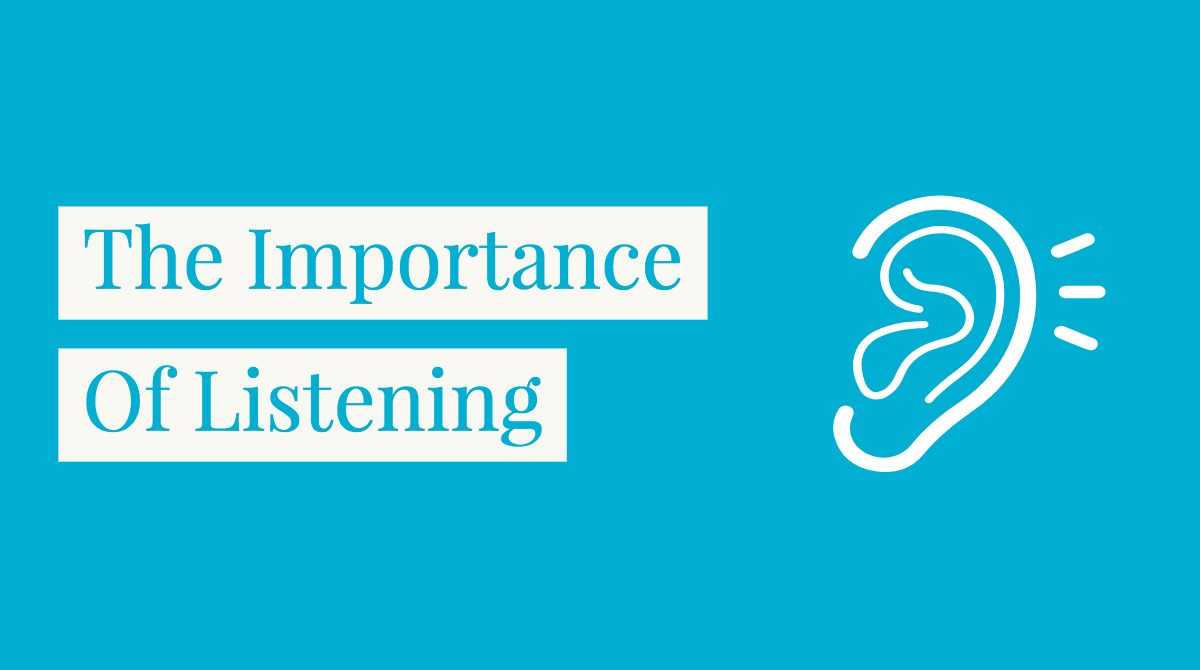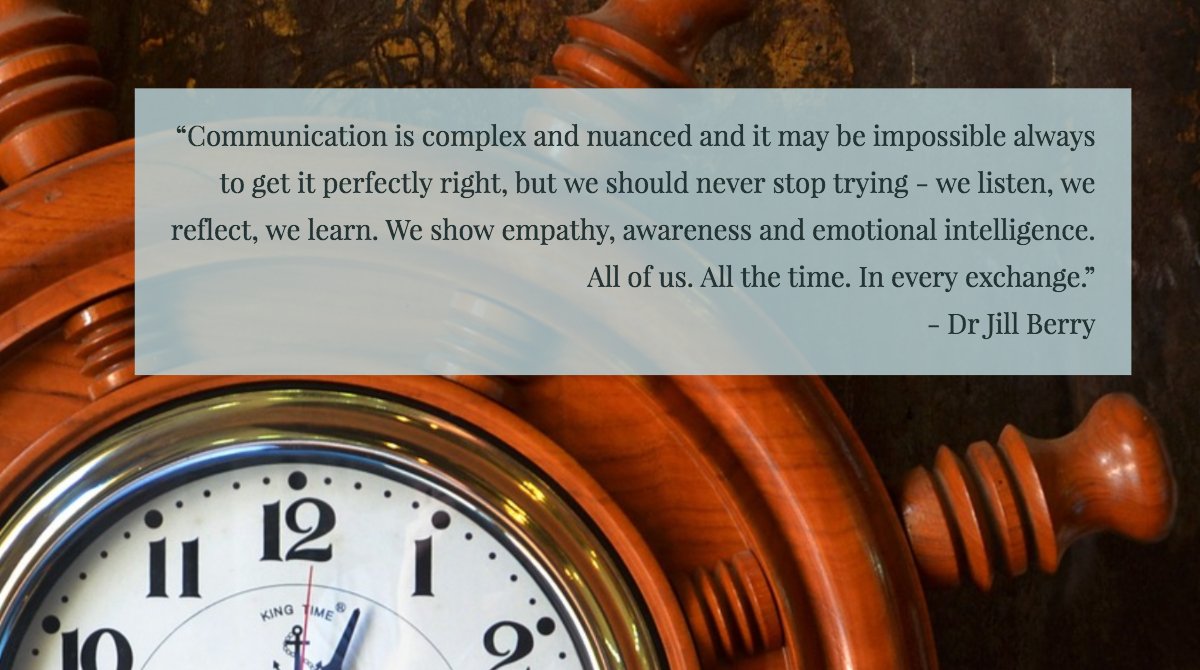
“There is as much wisdom in listening as there is in speaking – and that goes for all relationships, not just romantic ones.” – Daniel Dae Kim
I’ve been reflecting a lot on listening recently. I haven’t been the best at it but I’m trying to get better. The Greek philosopher Diogenes knew the importance of this when he said, “We have two ears and one tongue so that we would listen more and talk less” and I know that he’s right. Listening and listening actively is one of the most important skills I’m working on developing.
In this post I reflect upon listening and how we can better do it so that we can improve trust and develop stronger relationships in our interactions with, not just colleagues, but everyone in our lives. This post, whilst not inspired by Jill Berry’s recent post, this quote resonates hugely with my message where she said:
“Communication is complex and nuanced and it may be impossible always to get it perfectly right, but we should never stop trying – we listen, we reflect, we learn. We show empathy, awareness and emotional intelligence. All of us. All the time. In every exchange.”

Active listening
Active listening can help hugely but it really does require you to listen, and act! The most difficult part of that is the ‘act’ part but it can have and make a huge difference. Listening carefully to colleagues, even if it is on a topic where there is some negativity and then acting on it, shows that you do listen! It’s a skill that is difficult to master, get right and to turn that negativity from a colleague into positivity. So what can you do?
Something I struggle with, even now, is dealing with things in the heat of a moment. Often I can be too invested in a situation to be able to think about things objectively, but there are some steps I’m still learning that can help you too.
Firstly, try not to deal with the criticism or the thing you need to listen to carefully straight away. With criticism often comes heightened emotions and fears. You’ll probably be feeling particularly sensitive about the thing and so dealing with it there and then in the moment, without having given yourself the opportunity to calmly reflect upon it so that you can make a measured judgement, is probably not the best idea. What I find to be helpful is rather than jump straight into an analysis is to ask for some time to reflect or build yourself in a cushion or window of time to reflect carefully.
Secondly, try to remove the personal from the situation. Whether a criticism has been made of you or whether it’s a criticism of something you’re aiming towards as part of your vision, thinking about things objectively and taking time to reflect upon it is hugely beneficial. Think:
- Why is it the person has said that?
- What is making them think that?
- Are they right and if so what do I need to do about it?
- What can we do differently?
- Can this person help or can this question improve the situation?
Whichever way you look at it, taking time to reflect, to pause, digest and think carefully, is important. Equally it is important to not take things personally, whatever has been said to you. That isn’t easy sometimes, particularly when what might have been said has been a personal comment. Leadership can be a lonely place but you don’t have to suffer in silence. Professional friends from other institutions or from within your own teams, your coach, your trusted advisors; these people can help you to reflect and think carefully about what your next steps should be. Either which way, following your moral compass and your head, rather than your heart, is more often than not the right approach. Additionally, make sure any face to face conversations, which may be difficult ones too, are held in private. That way you can take the notes you want and deal with it however you see best fit. Here are my thoughts on dealing with difficult conversations. Having a desire and willingness to listen to colleagues though is key as is asking the right questions – a skill that will take you time to master and if you want good examples, if you haven’t been trained as a coach, do so. It will help you hugely.
I know how you can fail at it too. You have a vision. You are focused on achieving that goal and you’re making good progress. Yes there have been a few obstacles along the way but the goal is in sight. Yes a few of your colleagues have warned you about a few things that aren’t going so well, but you know that with everyone on board you’ll be there soon. The thing is. It is very easy for that vision you have to blind you from really listening to your colleagues. What is that they are actually saying? Why are they saying what they are saying? Is there anything that you need to do to help?
A feature of some of the best leaders I have come across has been their humility. If you speak to leaders who have proven to be brilliant over time, they will more often than not be very humble about their achievements and speak strongly of those that they’ve worked with extolling the brilliance of others giving credit away rather than taking it themselves. This is a trait which comes from involving whole teams in what you do and listening carefully to them in order to achieve your collective goals.
Backing down
Sometimes, backing down on an issue being presented to you is the best thing you can do. It might not be easy, but picking your battles is important. Making sure that you can be seen to be and demonstrate that you are ‘reasonable’ is a significant skill. This isn’t to say that you are a push over but in doing so you will show that you are a ‘listening leader’, show that you are reasonable, indicate that the opinions of others in your team are important and that you are prepared to show that you know that you aren’t always right on everything, is again a very powerful thing to show. It builds trust in your teams and allows you to perform collectively even better than you might otherwise have done, even when it isn’t easy!
Working together on things, backing down where necessary and then taking the time to collaborate to achieve a collectively agreed approach is something that can take a fair amount of time to achieve. The upshot of this though is that it will end with you being successful in the art of negotiating through difficult waters which will also help you to develop significant trust between you and your colleagues.
So what?
Actively listening and acting upon what you hear should not be seen as a negative or soft approach either. It takes significant strength of character and humility to take the time to listen and consult others. Listening can help you to find out more about a person, a situation, a plan for the future and improves your understanding and awareness. It doesn’t necessarily mean that you have to do something but in knowing and actively listening, your relationships with individuals improve too. Please also bear in mind that it can also take significant energy, given the time it can take. Don’t shy away from it though. It is an active, not passive, process, when done well. If you treat it as a passive experience then those you spend time with will not feel valued and neither party will get the best out of the investment in time. Try too to make sure that you ask the right questions in your meetings. Listening carefully and acting upon what you hear to ask the right questions can help lead a colleague through a process or plan they’re formulating. It could be any number of scenarios, but listening carefully is important so that you are able to respond in the right way, even if it is a difficult conversation.
Listening doesn’t always have to be auditory either; look for body language – is the person nervous? Are they emotional? Do they need access to that box of tissues on your desk? Can you make them feel comfortable enough to talk with you about whatever it is that is bothering them? It is from your previous interactions with your colleagues that will give them the confidence to be able to speak freely that will give you the opportunity to listen to them. Listening isn’t limited to your office either. Just like you can spot those children in your playgrounds that aren’t happy, you can often spot this in the body language of colleagues as they interact on site. Paying close attention to the wellbeing of others is important. It is our responsibility to make sure all are supported to be as healthy and happy as possible in our places of work.
You can show that you have listened in lots of different ways. It could be that you act, based upon the information you have seen or been given. Your responses to colleagues when talking can show this too based upon subsequent questions you may ask them. Often paraphrasing what you’ve just been told is a great way of demonstrating that you are listening. Giving a bit of yourself too, sharing a similar experience can also show that you are listening. Listening though isn’t necessarily about giving advice, unless you have heard from the person you are talking with that they would like your advice. Being empathetic shows that you care but forcing your advice and action onto someone can go against all of the trust being shown to you by talking with you in the first place. And so while I started with a quote and have included a few throughout the post too, I’ll finish by saying this…
I’ve learned over the years (and this was from a Head that inspired me greatly) that good leadership is about positive relationships and mutual respect. As Bryant H. McGill said, “One of the most sincere forms of respect is actually listening to what another has to say.” So with that in mind, listen good, act well.













